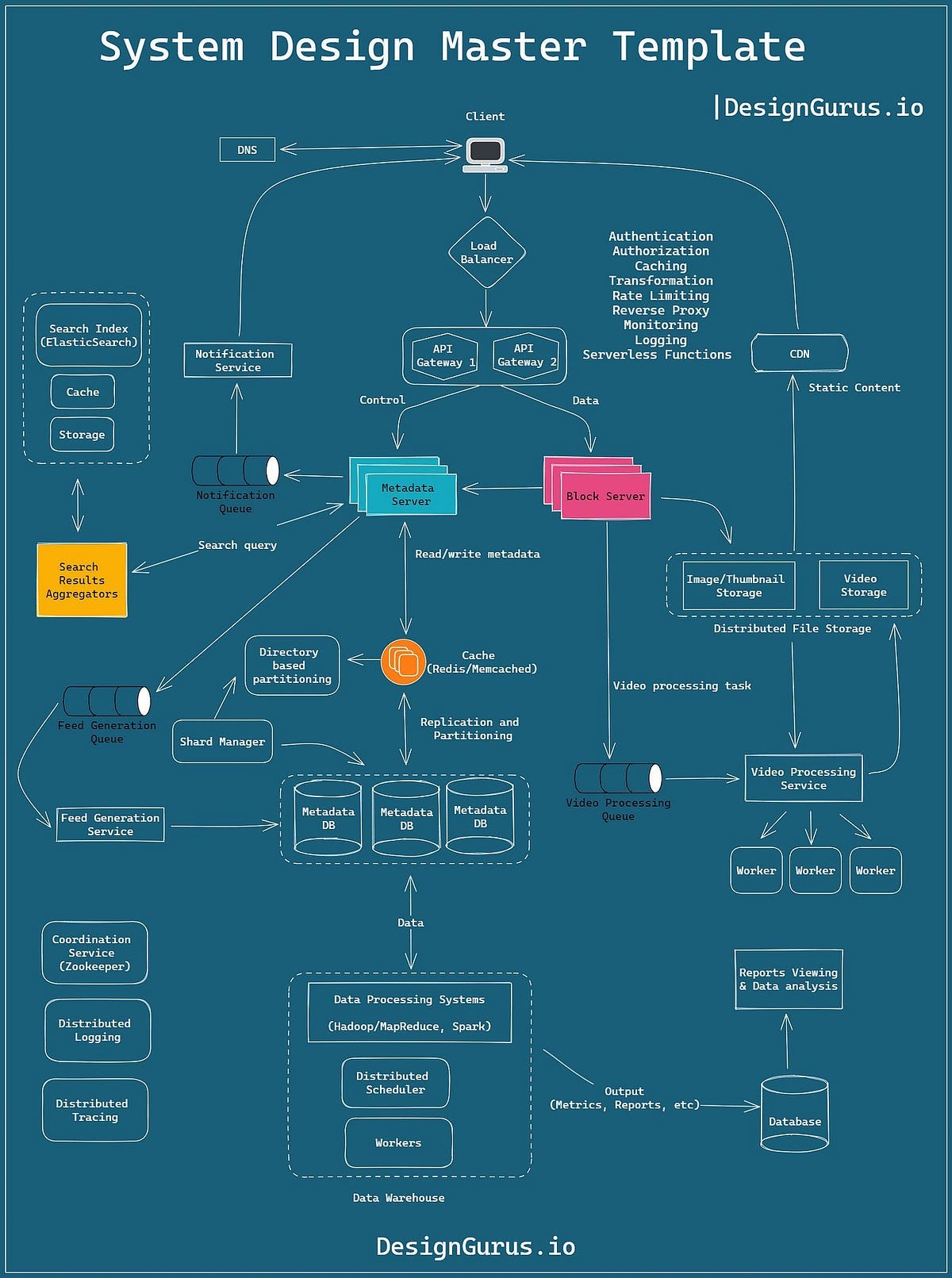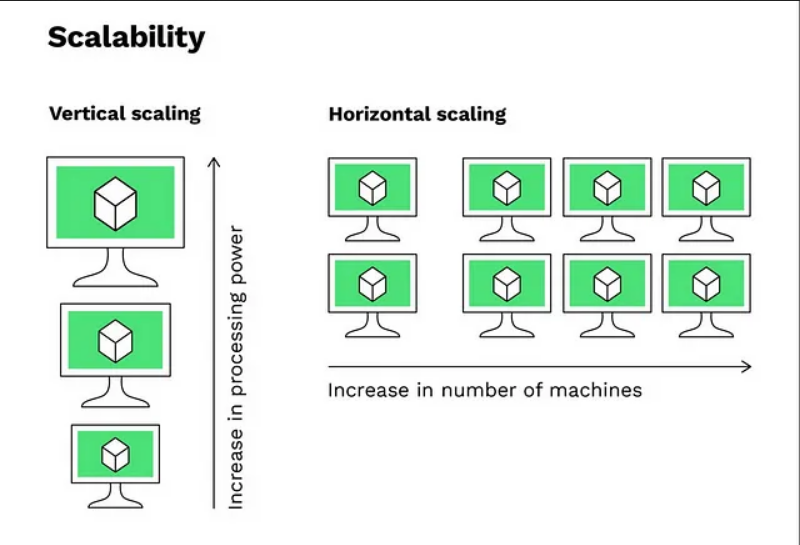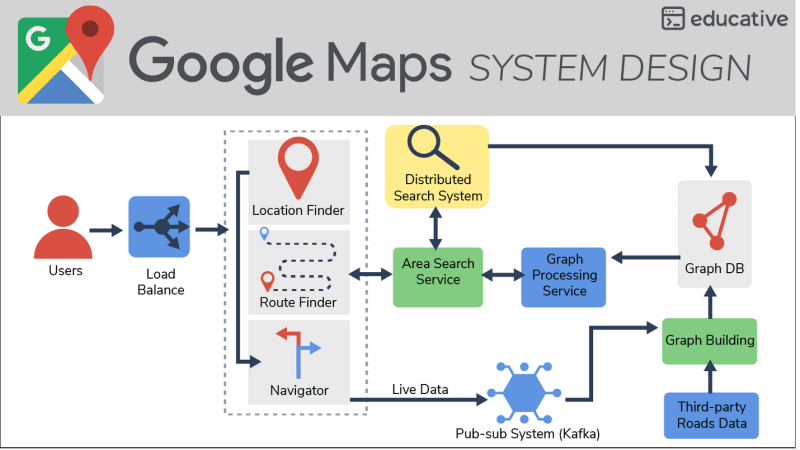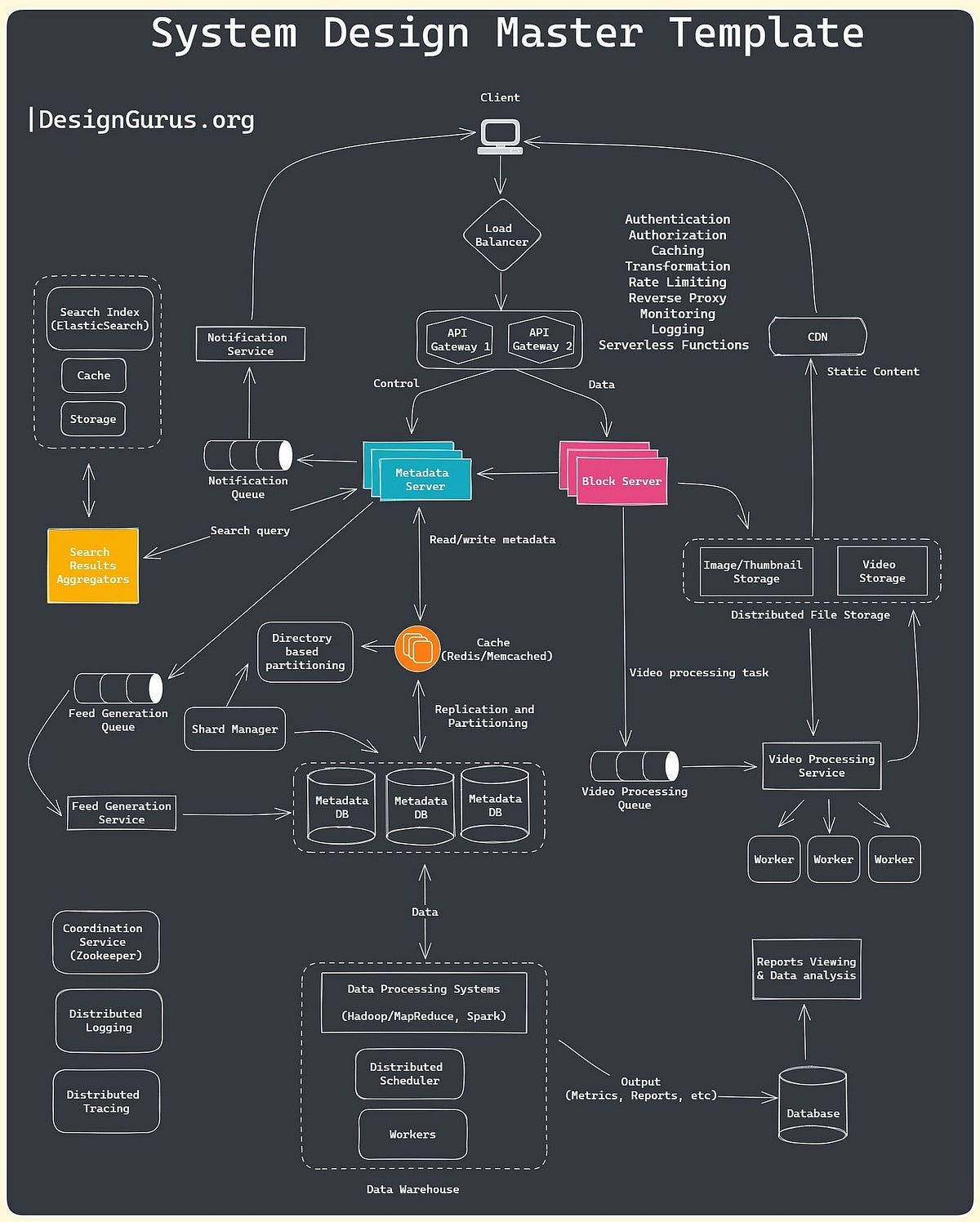10 Reasons to Learn System Design in 2024 by Javinpaul Javarevisited Jan, 2024 Medium
10 Reasons to Learn System Design in 2024 | by javinpaul | Javarevisited | Jan, 2024 | Medium #
Excerpt #
Hello guys, if you are preparing for tech interview and wondering whether you should learn System design in 2024 or not then you have come to the right place. Earlier, I have mentioned about System…
Practical reasons to learn System design with links to resources #
[

]( https://medium.com/@javinpaul?source=post_page-----fa795d301f62--------------------------------)[

]( https://medium.com/javarevisited?source=post_page-----fa795d301f62--------------------------------)
[

image_credit — DesignGuru.io
Hello guys, if you are preparing for tech interview and wondering whether you should learn System design in 2024 or not then you have come to the right place. Earlier, I have mentioned about System Design in my article 10 Essential Topics for Coding interviews and System Design was one of them.
While Coding interview remains the single most important reason to learn System Design in 2024, in my work in quest to improve my System design skills have found many more reasons to learn System design which I am going to share with you in this article.
Earlier, I have also shared best System design courses, books, websites, and interview questions which are great to start with and if you haven’t checked them yet, I suggest you to go through them, they will ignite your passion for System design much more.
In a world which increasingly reliant on technology, the importance of honing one’s skills in various tech domains cannot be overstated. However, as we delve into the intricacies of the digital realm, there might be instances where delving into a particular subject isn’t the optimal choice for everyone.
System design is an essential skill that has gained significant prominence in the ever-evolving landscape of technology. As we step into 2024, the importance of mastering system design becomes even more apparent for designing Distributed system which can withstand test of time.
By the way, if you are in hurry, and just want to learn System design for interviews then I suggest you go and join either ByteByteGo by Alex Xu, or DesignGuru.io, both of them are great resources to prepare for System design interviews, as well as learn Software design in detail.
10 Reasons to Learn System Design in 2024 #
Here are ten compelling reasons why learning system design is a crucial investment in your career and the resources that can help you embark on this journey.
1. Scalability Matters #
In the era of cloud computing and ever-growing user bases, designing scalable systems is imperative. System design equips you with the knowledge to create architectures that can handle increasing loads and user demands.
For example, I didn’t know about horizontal scalability and vertical scalability until I started learning about System Design so I can vouch about this reason.
In fact, when I first mentioned about horizontal and vertical scaling, my interviewer was so impressed that I end up getting offer for a senior position which was higher than my experience. You can learn more about Scalability on classic Grokking the System Design Interview course on DesignGuru.io.
[

2. Enhanced Problem-Solving Skills #
System design significantly enhances problem-solving skills by fostering a holistic and structured approach to addressing complex challenges . Engaging in system design requires breaking down intricate problems into manageable components, allowing for a systematic analysis of each element’s functionality and interdependencies.
This meticulous process encourages individuals to think critically, anticipate potential bottlenecks, and devise efficient solutions. Moreover, system design promotes the identification of trade-offs, helping practitioners strike a balance between competing factors such as performance, scalability, and maintainability.
By honing these problem-solving skills within the context of system design, individuals not only become adept at resolving technical issues but also develop a broader problem-solving mindset that is applicable across various domains and scenarios.
In short, System design challenges you to think critically and solve complex problems. It encourages a holistic approach to problem-solving, considering various components and their interactions within a system.
Solving classic System design problems like WhatsApp Design, YouTube Design, URL Shortener, rand Google Map design will definitely improve your problem solving skill, just try yourself.
[

3. In-Demand Skill for Interviews #
System design has emerged as a highly sought-after skill in the realm of technical interviews, reflecting its integral role in assessing a candidate’s comprehensive understanding of software architecture and problem-solving prowess.
Many top technology companies place a significant emphasis on system design interviews to evaluate candidates’ abilities to design scalable, efficient, and reliable systems.
Mastering system design not only demonstrates proficiency in tackling real-world engineering challenges but also showcases a candidate’s capacity to think critically, make informed design decisions, and consider trade-offs.
As companies increasingly rely on complex, distributed systems, the ability to articulate and implement effective system designs has become a key differentiator in the hiring process.
Consequently, acquiring system design skills has become essential for aspiring engineers looking to excel in technical interviews and secure positions in top-tier tech organizations.
In short, Tech giants and startups alike prioritize system design in their interview processes. A solid understanding of system design principles can set you apart in technical interviews and help you land coveted roles.
If you learning SYstem Design for interviews, I suggest you to either checkout ByteByteGo by Alex Xu, or DesignGuru.io, for better preparations
[

]( https://designgurus.org/link/84Y9hP)
4. Real-World Applications #
The principles of system design are applicable across diverse domains, from e-commerce platforms to social media networks. Learning system design empowers you to create solutions that address real-world challenges in different industries.
From developing e-commerce platforms capable of handling millions of transactions to designing secure and interoperable healthcare information systems, system design principles are indispensable.
In the age of technology, where everything from social media networks to autonomous vehicles relies on intricate systems, understanding how to architect, optimize, and manage these systems becomes a valuable skill.
Whether it’s enhancing the user experience on content streaming services, ensuring the reliability of cloud computing infrastructure, or optimizing supply chain processes, a solid grasp of system design empowers individuals to tackle complex challenges and contribute meaningfully to technological advancements.
Therefore, the real-world applications of system design serve as a compelling reason to delve into this field, equipping individuals with the expertise needed to shape the future of technology.
5. Efficiency and Optimization #
System design also involves optimizing performance and resource utilization. By learning this skill, you can create systems that operate efficiently, minimizing costs and maximizing overall performance.
Learning system design allows individuals to understand the intricacies of resource allocation, load balancing, and algorithmic efficiency, enabling them to craft systems that deliver optimal results.
Whether it’s minimizing response times in web applications, reducing energy consumption in IoT devices, or optimizing data processing pipelines, a strong foundation in system design empowers professionals to tackle these challenges systematically.
In today’s competitive environment, where users expect seamless experiences and businesses demand cost-effective solutions, the skills acquired through system design play a crucial role in creating technology that is both powerful and resource-efficient.
Thus, the pursuit of efficiency and optimization serves as a compelling incentive for individuals to master the art of system design.
6. Preparation for Leadership Roles #
Aspiring leaders in the field of computer science and engineering must possess a holistic understanding of how complex systems operate and interact.
System design offers a comprehensive framework for tackling intricate problems, fostering critical thinking, and making informed decisions about architecture and scalability.
By mastering system design concepts, individuals not only enhance their technical prowess but also develop the ability to lead and guide teams in architecting solutions that align with organizational goals.
System design cultivates skills in anticipating challenges, making trade-offs, and envisioning the bigger picture — qualities essential for effective leadership in the technology industry.
As organizations increasingly rely on technology to drive innovation and efficiency, individuals with a strong grasp of system design are better equipped to assume leadership roles, contributing to the strategic vision and success of their teams and companies.
As you progress in your career, the ability to design scalable and efficient systems becomes crucial for leadership positions. Learning system design prepares you for roles where strategic thinking and decision-making are paramount.
Hence, preparing for leadership roles stands out as a compelling reason to embark on the journey of learning system design.
7. Understanding Distributed Systems #
In the age of distributed computing, system design helps you grasp the intricacies of building and managing systems that operate across multiple nodes and data centers.
Learning about distributed systems provides invaluable insights into designing scalable, resilient, and efficient architectures that operate seamlessly in a networked environment.
This knowledge is crucial for system designers, as it empowers them to tackle the complexities of real-world applications that span multiple nodes and ensure optimal performance.
Moreover, in an era where distributed computing is pervasive, understanding how to design systems that can handle challenges like fault tolerance and efficient resource utilization becomes a critical skill set.
Therefore, grasping the intricacies of distributed systems serves as a compelling reason to embark on the journey of learning system design, offering a deeper understanding of the complexities involved in building robust and scalable applications in today’s interconnected world.
8. Adaptability to New Technologies #
The tech industry evolves rapidly. System design principles provide a strong foundation, making it easier for you to adapt to emerging technologies and integrate them into existing systems seamlessly.
9. Contribution to Open Source Projects #
Many open-source projects require contributors with system design expertise. Engaging in such projects not only enhances your skills but also allows you to collaborate with a diverse community of developers.
10. Designing Complex Software #
In today’s fast-paced technological landscape, the ability to design systems that can scale seamlessly is a paramount skill. System design empowers you to create architectures capable of handling increasing loads and adapting to the growing demands of users and data.
Whether you are developing web applications, cloud services, or distributed systems, understanding the principles of system design allows you to construct robust solutions that can effortlessly scale horizontally, ensuring optimal performance and reliability even as your projects evolve.
By mastering system design, you gain the expertise needed to create solutions that grow alongside the ever-expanding digital landscape.
System Design Resources to Get Started #
Here are the best resources, both online and offline which you can use to learn System Design in 2024:
Books: “Designing Data-Intensive Applications” by Martin Kleppmann and “System Design Interview” by Alex Xu are excellent resources for comprehensive learning.
Online Platforms: Websites like ByteByteGo, DesignGuru, Exponent, LeetCode, HackerRank, and Educative.io offer interactive courses and practice problems to reinforce system design concepts.
YouTube Channels: Channels like Tech Dummies and Gaurav Sen provide insightful videos breaking down various system design topics.
Networking: Engage with professionals in the field, join forums like Stack Overflow, and participate in discussions to gain practical insights and advice.
Online Courses: If you like video courses then you can also checkout Mastering the System Design Interview by Frank Kane and CodeKarle’s System Design Interview Course on Udemy courses form Udemy to learn System design
Conclusion #
In conclusion, investing time and effort in learning system design in 2024 is a strategic move that can significantly boost your career in the ever-evolving tech industry. Whether you are a seasoned developer or just starting, acquiring system design skills is an investment that pays off in terms of career growth, problem-solving acumen, and contributions to the broader tech community.
Other System Design articles and tutorials you may like
- How to Prepare for System Design Interview
- Is ByteByteGo best place to learn System Design?
- 30 System Design Interview Questions for Practice
- Is Exponent’s System Design Course worth it?
- 10 Free System Design courses and tutorials for beginners
- 10 System Design Topics for Interviews
- 8 Best Courses to learn SOA and Microservices Architecture
- 3 System Design Cheat Sheet for Interviews
- Is ByteByteGo System Design course worth it?
- How to Crack System Design Interview in 2024
- Is System Design Insider Guide book worth it?
- Is Designing Data Intensive application book worth it?
Thanks for reading this article so far. If you know any other excellent online resources like websites or programming platforms to learn System Design and Software Designing, especially for beginners, which you think complements these two websites, then feel free to share. Everybody loves great resources and happy learning System design.
P. S. — If you want to do just one thing then I suggest you to join ByteByteGo, one of the best place to learn SYstem design, you will thank me later.